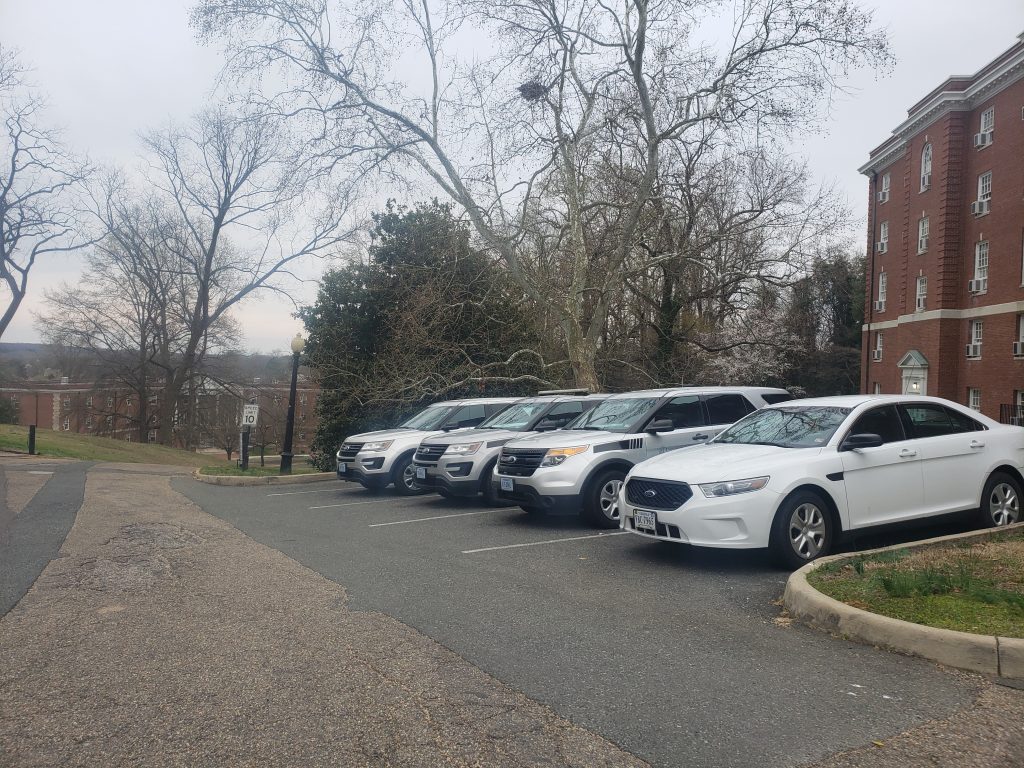Liability vs. responsibility: UMW police care for students within reason
3 min read
Misunderstanding of campus police policy causes upset for students. ( Alicen Hackney | The Blue & Gray Press)
By KAITLYN O’GORMAN
Staff Writer
A few weeks ago, in the Sunken parking lot, a couple of friends and I were approached by a distraught girl who requested our help in jump-starting her car. We, of course, helped the girl and got her car up and running, despite the four inches of rainwater that had conveniently pooled under her vehicle. She told the three of us that she had called UMW Police for help, but they told her that they don’t do jumps.
My friends and I were understandably frustrated with this information because it is the campus police’s job to keep us safe and to be there when we need them. What if it was late and no one was there to help? Anything could have happened.
My biggest concern was what seemed to be a total lack of transparency and failed communication with what non-emergency services campus police offer. Chief Michael Hall clarified that campus police are not legally permitted to jump someone’s car due to liability reasons. They are, however, more than happy to go out and wait with you for road service or while you utilize the battery-powered jump starter that campus police provide for staff and students to rent out when such a situation arises.
“Our staff, and what we’re responsible for, is to ensure the safety of the student,” says Hall. “We can’t be the mechanics of the vehicles [but we can] wait for a tow truck, call someone like a parent or a mechanic. We can provide assistance without jeopardizing, creating a liability, or putting a student in harm’s way.”
Turns out there’s a lot of things that our campus police do to bridge the communication gap.
“I tell a lot of students about our Rave app, and they choose not to download it,” said Hall. “Our website is filled with information on services we provide… We have meetings, and we ask to be invited to come to talk to groups… very little participation. We have the R.A.D. program (Rape Aggression Defense), and very low participation in that, and yet everyone wants to do something in self-defense. We offer it twice a semester and a lot of times we end up having to cancel those classes because no one wants to participate.”
Hall wanted to be sure to clarify that this lack of awareness isn’t just a problem with the students, it’s a problem with the faculty and staff as well.
“People think ‘oh this won’t happen to me’ so they don’t want to get involved with it. Those are the challenges we deal with, we offer these programs, we get out there, we talk to students, we tell people about our services and they don’t engage. Most people could care less whether or not we have a drug drop off box in the communication center because if they don’t need it they don’t care about it… It’s what we dealt with when we had the shelter in place… these are all things that we have plans for and talk about but most people [think] ‘it’s not happening to me’, ‘it’s not bothering me’, so they don’t care.”
As a community, we all have a responsibility for our own, and each other’s, safety and wellbeing. Our campus police officers are doing everything in their power to keep us safe, and by being blatantly uninformed we’re making their jobs so much harder.
Admittedly, I too am part of the problem. I wasn’t up in arms about the communication between campus police and students until I was met by the frantic girl in the sunken lot. Instead of looking into her story and fact-checking, I blindly believed her and assumed that it was all campus police’s fault.
Go to their website, read up on the safety procedures already put in place, follow them on Facebook, download the Rave app, be more involved, give suggestions for improvement, and as Hall said, “don’t believe what other people say.”


